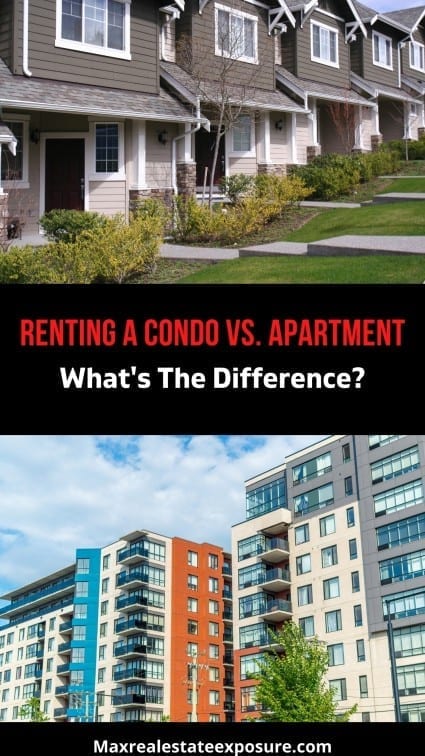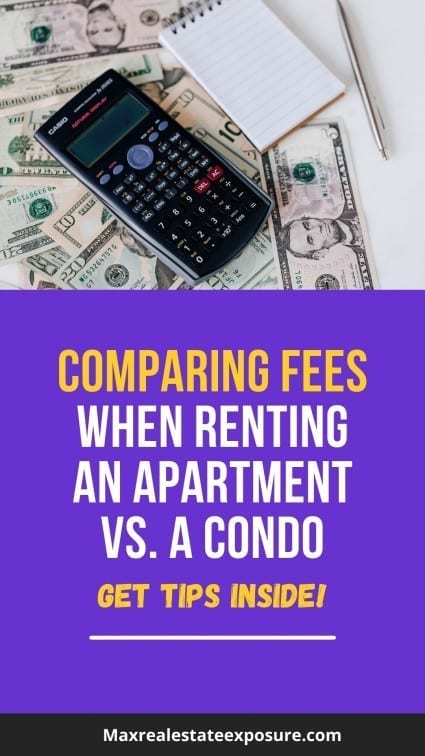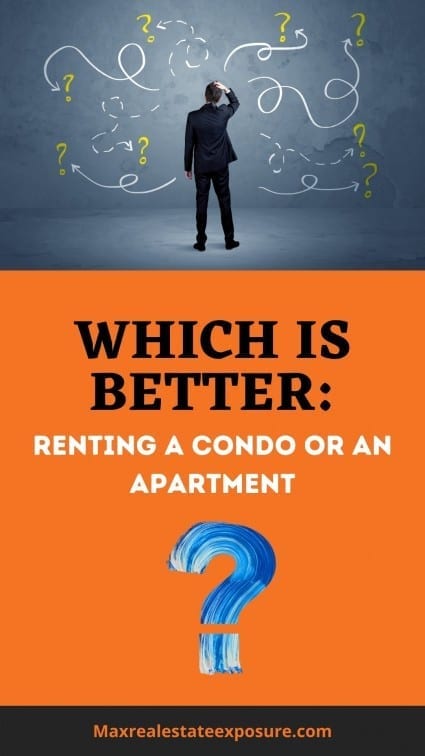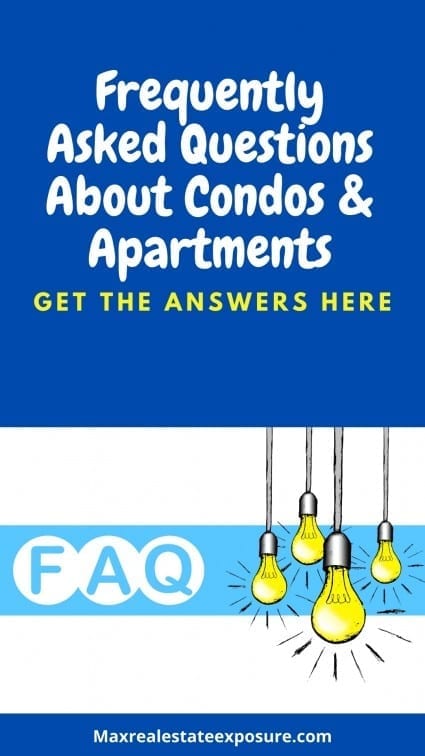Differences Between Renting an Apartment and a Condo
 Renting condos and apartments can be easily confused. There are many significant differences you need to understand when you are choosing between these property types.
Renting condos and apartments can be easily confused. There are many significant differences you need to understand when you are choosing between these property types.
Some home types are different, like a townhouse and an apartment. But when it comes to apartments vs. condos, the differences may be harder to spot.
If you ask what a condo is, you wouldn’t be alone, and we have the answers.
Searching for your next home can take a lot of time, so anything you can do to narrow down the search is good.
Understanding the differences between these types of homes should make your search a little easier.
When you weigh up the choice of apartment vs. condo, there are many things to consider. Your lifestyle priorities are essential to understand so that you can match them to the type of home you rent.
Whether you are looking at renting condos or apartments, you should know the nuances to better decide on the right home for you.
In the past, we have looked at the difference between renting a house vs. a condo, and now you’ll get an in-depth overview of apartments vs. condos.
Lots of people ask which is better, a condo or an apartment. The answer will be more of an individual preference, but we’ll deeply dive into both pros and cons.
What is a Condo?
A condo or condominium is a residential home within a development that can be rented to tenants. They are privately owned individual units within a building of other units.
Condominium owners have joint ownership of common areas and amenities such as garages, elevators, pools, tennis courts, gyms, and other potential perks.
These properties are owned by private individuals instead of a management company, and the owner decides who to rent to. The condo meaning can escape numerous people, but these are the basics. The most significant difference between a condo vs. an apartment is ownership.
An HOA almost always runs condos with ground rules that owners and tenants must follow. When buying a condo, knowing the rules and regulations is vital.
You could easily fund yourself in an untenable situation if you don’t care for the covenants, conditions, and restrictions set.
Another difference when comparing condos to apartments is that condos tend to have more customization, given that they are purchased properties. Owners typically customize them to their taste by investing in amenities and upgrades at the time of purchase.
While there are differences between condos and townhouses, they are similar in this respect.
Renting condos may seem an automatic winner, but that is not necessarily true.
How an Apartment Differs From a Condo Rental
An apartment is a home in a residential building owned and administered by a property management company. All of the tenants in the complex will deal with the property manager who works for the management company. They might have an office on-site, often situated with the leasing office.
The differences between the two types of homes aren’t necessarily apparent by looking at the unit itself. Some things more clearly indicate whether the property is a condo or an apartment, though.
These include ownership, rules, fees, maintenance, and available amenities.
These factors work out differently depending on whether the home is a condo or an apartment. Let’s review these factors more closely.
Ownership Only Applies to Condos
 While both types of property will share facilities and communal areas, it is understandable that they are often confused.
While both types of property will share facilities and communal areas, it is understandable that they are often confused.
The unit’s ownership is perhaps the best way to establish whether you are looking at an apartment or a condo.
If you are looking at a condo, each property in the complex will likely have a different owner. These owners don’t have anything to do with managing the building the unit is located in.
Usually, management of the building will fall to a condominium association.
The ownership of condos is similar to traditional houses, where an individual purchases the home. An owner could even have purchased a few condominiums in the building and rented them out.
Usually, an apartment has one owner for the whole building. These properties can’t be purchased and are rented out to different tenants.
It would be highly unusual for an apartment building owner not to employ a management company to act on their behalf and deal with running the building.
If you rent an apartment, you may never meet the owner, only dealing with a property manager.
Rules When Renting Condos vs. Apartments
The rules you must follow aren’t necessarily the same when renting either type of home. Your lease agreement should outline the rules you must follow when you move in, but let’s look at the main differences.
Since an HOA will be in charge of the communal areas of a condo complex, they will set the rules. The owner of an individual unit might have their own rules that they require their tenants to follow, which should be evident in the lease.
If you aren’t sure of the rules, ask before signing the agreement.
The HOA rules can apply to both the renter and the owner, but they tend to be something that will concern the owner more. There could be fees that could partly be the tenant’s responsibility, but this isn’t always the case.
Most of the time, when renting condos, the monthly condo fees will be covered by the owner.
With an apartment rental, the rules described in the lease will be overseen by the management company. All the tenants will have to follow the same rules, and you can typically expect basic requirements to be the following:
- Being on time with rent
- Sticking to the rules in the lease
- Keeping the apartment clean
- Dealing with garbage correctly
- Not disturbing your neighbors with noise
There can be other rules as well. There are often rules regarding pets, how many and of what type, or if they are allowed. Since a condo is owned, you may also be unable to smoke cigarettes.
Fees When Renting Condos vs. Apartments
 The fees you must pay will differ between apartments and condos. There will always be costs to pay when you sign a lease for either type of home, which will often be due when signing the contract.
The fees you must pay will differ between apartments and condos. There will always be costs to pay when you sign a lease for either type of home, which will often be due when signing the contract.
Make sure you understand what they expect you to pay before you go to sign the lease.
When renting condos, the unit’s owner decides what you will pay. This will be set out in the lease, and you will often be paying a different rent to other units in the building.
The utilities and HOA fees may be included as part of the rent as a flat fee for the condo. This makes your monthly expenses for living in the home the same throughout the lease. But if they are omitted, you can expect to pay around $200 on average per month, though the HOA fees can vary depending on the amenities they provide.
When renting apartments, leases generally last a year until they need to be renewed. However, some management companies will offer short-term leases where you can rent for less time.
Leases that offer the flexibility of month-to-month contracts are also sometimes available.
These shorter-term agreements are called tenancy at-will contracts.
The rent for an apartment will typically stay the same for the lease period. However, the rent can be increased during the lease, though they must provide tenants with sufficient notice of this change.
The rent in an apartment is generally decided based on market conditions and the available units in the building.
If the market is strong and there is demand for apartments, the rent will be higher.
There can be other costs when renting an apartment, though, check with the management company before agreeing to the lease. Sometimes the management company will require tenants to pay renters insurance, an extra monthly expense.
The utilities are less likely to be included as part of the rent with an apartment. This will mean that your monthly outgoings will vary more due to seasonal conditions.
Maintenance When Renting Condominiums
When you have a maintenance issue in your home, there will be some differences when comparing condo vs. apartment. The speed at which a problem is dealt with and who has to pay the bill is often different.
If you live in a condo, the responsibility for dealing with maintenance could be on you or the owner. This might mean additional expenses that you weren’t expecting.
If they aren’t already mentioned, you should have these maintenance responsibilities worked out in advance and added as part of the lease. This way, there isn’t any confusion when something goes wrong.
When a problem does happen, you will have to contact the condo owner to get it resolved. You might find it challenging to reach the owner when you need them, leading to a delay in addressing the issue. Some discussion might also be required to arrange the repair, further delaying fixing the problem.
Some issues, however, could be the responsibility of the tenant. This will mean you need to arrange the repairs and pay the bill.
Maintenance issues that are outside of the condo will be the responsibility of the HOA. If you find something wrong in the building’s communal areas, contact the homeowners association to deal with it.
Maintenance When Renting Apartments
With apartments, dealing with maintenance problems is generally going to be easier. It will typically be free. The management company might even operate an online service to report problems.
Often they will be able to deal with emergency maintenance around the clock, so if a problem develops outside of regular business hours, you don’t need to worry.
The property manager also oversees the common areas in apartment buildings. You will likely have the same point of contact with the management company for problems in common areas or your apartment.
Either way, it will not cost you anything extra, as these expenses have already been factored into your rent.
Living in an apartment means you have less to worry about regarding maintenance. You will save time and money when problems occur, usually getting things fixed sooner without any out-of-pocket expenses.
One of the best things about renting an apartment is the fact you don't have to worry about the upkeep and to fix things yourself when there is a problem.Click To TweetAvailable Amenities in Condos vs. Apartments
The amenities offered to residents of these two homes are frequently similar, with more significant differences depending on when the complex was constructed. Though there can be some more subtle differences, this is something you should know about when comparing an apartment vs. a condo.
The amenities offered inside a condo unit are often better than those in an apartment. Since a condo has an individual owner or investor, they want a better return on owning the home. This can lead to improvements being made that increase their rental income.
When renting condos, the amenities tend to be of higher quality and can be unique to that home compared to the other units in the complex. The owner might spend money on upgrades.
For example, the condo could have upgraded granite counters, stainless kitchen appliances, crown moldings, and hardwood floors. Owners often make these improvements as they make the condo easier to rent.
Apartments generally have more consistent amenities. Sometimes the property management company might offer you the option of upgraded appliances, but this often won’t be the situation.
There are likely to be amenities available in the common areas of apartment buildings. These include a laundry room, gym, pool, and parking. Though you will have to pay more for the better amenities available in an apartment building, the same is typically true in condos.
Renting Condos vs. Apartments: Which is Better For You?
 There are pluses and minuses when comparing condos vs. apartments. Your final decision will come down to your requirements. It would be best if you were clear on what you are looking for and your main priorities before you begin to search.
There are pluses and minuses when comparing condos vs. apartments. Your final decision will come down to your requirements. It would be best if you were clear on what you are looking for and your main priorities before you begin to search.
Even then, individual condos or apartment complexes might offer features closer to what you expect from the other type of home, blurring the lines even further.
When you do have a good understanding of the things you need in a home, you should be better equipped to find either an apartment or a condo that suits your lifestyle.
Who Are Rental Condos Better For?
Typically, renting condos is better for someone who prefers having a single landlord rather than dealing with a large management company. This can mean a landlord is more willing to compromise on the rental terms and offer a more personalized experience when problems arise.
Condo properties are going to be more individual and can offer higher quality amenities within the home. If these are things, you value, condo living might be a better option.
If you are over 55 and looking for a rental property, you’ll probably have an easier time finding a property to rent in a retirement community. Finding apartment complexes that cater just to older parties is much more unusual.
Private owner apartments for rent usually don’t have any special age designations.
Who Are Apartments Rentals Better For?
Generally, renting private owner apartments could be better if you like the idea of a fixed monthly rental cost that includes dealing with repairs.
You should benefit from faster repairs when the almost inevitable problems arise too. You won’t have to pay extra to a homeowner association, which could be quite a savings.
Choosing between an apartment and a condo isn’t easy, but hopefully, our key differences will help you make a more informed choice.
If you are clear on what you need in a home and what these different rental properties offer, you should live in a home that better meets your lifestyle requirements.
Finding Either Apartment or Condo Rentals
One of the best ways to find condo rentals or apartment rentals is to find a local real estate agent. Some real estate companies will specialize in dealing with rentals only. You don’t necessarily need to go that route, but it might be the best option.
You might also be able to find rentals by searching online. Going online, you may find that condo rentals near me or apartment rentals near me could lead to some choices. You could also try condos for rent near me.
Some folks may be trying to rent their property without the assistance of a real estate company.
Applying For Apartment Rentals vs. Condo Rentals
You must fill out a rental application when trying to land either an apartment rental or a condo rental. Rental applications will usually require the following information:
- Photo identification
- All of your contact information
- Your social security number for running a credit check
- Proof of employment
- Copies of your last couple of bank statements
- Copies of your most recent pay stubs
- Contact info of previous landlords
- Possibly some references
If you know you lack good credit; fewer owners will probably accept your rental application. Landlords want to be confident that you will consistently pay your rent every month.
With a history of not doing so, that becomes less likely to happen. You may have to seek out a no-credit-check apartment. Renting condos or apartments will be far more challenging when you don’t have a solid credit history.
Our article, however, will give you some pointers to overcome that potentially.
Frequently Asked Questions About Condos and Apartments
Let’s examine some of the FAQs of renting a condo vs. an apartment
 1. Are Condos Quieter Than Apartments?
1. Are Condos Quieter Than Apartments?
If the condo is a townhouse style with side-by-side units, they will be less noisy than an apartment. Most noise generated by apartment living comes from the people living above you.
2. Do Renters Pay Condo Fees?
The vast majority of the time, an owner will be paying for the condo fees. It is unusual that a renter would pay an owner’s condo fees.
3. What is The Downside of Living in a Condo vs. an Apartment I May Not Have Considered?
One of the more significant drawbacks of renting a condo is that the owner could decide they want to sell. If you have enjoyed living in the unit and have planned to stay for an extended time, you may find it disappointing to get uprooted because of a sale.
4. What is The Downside of Living in an Apartment?
Apartments tend to be much more transient than living in a condo. You could be just getting to know your neighbors; the next thing you know, they are moving out.
Final Thoughts on Condo Renting vs. Apartment Renting
Choosing between condo and apartment rentals will always have pros and cons. It is up to you to decide which is the best option. There may be a no right or wrong choice.
Hopefully, our rental guide has clarified the difference between an apartment and a condo.
About the author: Bill Gassett, a nationally recognized leader in his field, provided the above Real Estate information on renting condos vs. apartments. Bill can be reached via email at billgassett@remaxexec.com or by phone at 508-625-0191. Bill has helped people move in and out of Metrowest towns for 37+ years.
Are you thinking of selling your home? I am passionate about Real Estate and love sharing my marketing expertise!
I service Real Estate Sales in the following Metrowest MA towns: Ashland, Bellingham, Douglas, Framingham, Franklin, Grafton, Holliston, Hopkinton, Hopedale, Medway, Mendon, Milford, Millbury, Millville, Natick, Northborough, Northbridge, Shrewsbury, Southborough, Sutton, Wayland, Westborough, Whitinsville, Worcester, Upton, and Uxbridge MA.


 1. Are Condos Quieter Than Apartments?
1. Are Condos Quieter Than Apartments?